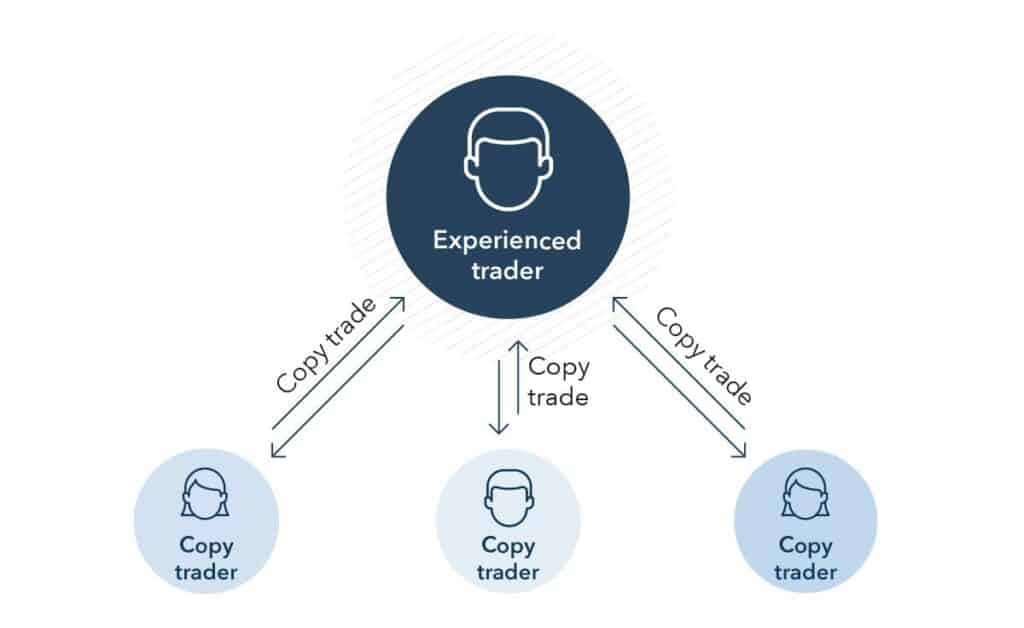In recent years there has been a rise in the popularity of “Social Trading”. That’s where traders get together on social and trading platforms to discuss investment ideas with each other. If Social Trading is a more general area, “Copy Trading” goes one step further and is far more specific. In Copy Trading, traders will directly copy the investment moves of other traders.
Copy trading comes with its advantages and its disadvantages. We will discuss what we believe are the important aspects to consider when deciding whether it is right for you. Ultimately though, is copy trading any good? Let’s have a look.

What is Copy Trading?
Copy trading sits under the bigger umbrella of social trading. As we already mentioned, social trading involves a community of traders all discussing their views and what they see as investing opportunities. Traders can then decide what to trade.
Copy trading takes the concept of the community and makes it more specific. Copy trading should not be confused with “Mirror Trading”. Mirror trading uses a set of algorithms to analyse and determine a broad strategy from what other traders are doing. Copy Trading is less technical (no collating or algorithms) and again, is more specific than Mirror Trading, in that it involves the direct copying of investment decisions by another trader.
A copy trader is allowed to follow other traders (usually, but not always) in exchange for a fee. All of the investment decisions are then replicated by the platform into their account. Everything is done in real-time and is instantaneous. There are no trading decisions to make, aside from which traders you would like to copy.
The master traders all advertise themselves on the platform. There will usually be a good variety of traders to choose from, each giving information on their performance track record, highlighting their preferred investment areas and any costs involved.

What are the benefits of Copy Trading?
Let’s first of all look at what’s good about copy trading:
- It’s great for beginners – If you are just starting on the road of trading in financial markets, copy trading can be a great way to get you into your stride. It means that you can gain knowledge of markets and investments that you might never previously have thought was possible. It can be a great learning curve for novice traders.
- Gain access to the professionals – These people are professionals (or at least claim to be). You can monitor what your master trader is investing in and learn the various moves they make. You can study the market conditions of when they placed the trade and when they closed the position. You can see how a professional trader manages their portfolio, with exposure to various investments and risk exposure. If you follow closely enough, it is the sort of shadowing of a trader you might only have previously been able to do by working on a trading desk at a big bank. All from the comfort of your own home.
- A good way to diversify – Copy trading can enable you to gain exposure to more markets and asset classes than perhaps you might if you were running your own trading account. This is especially true of small trading accounts. This can help significantly with the diversification of your investment exposure. Professional traders can be far more knowledgeable about exactly how to balance the risk management of a portfolio. This is certainly helpful for novice traders who may easily fall into the trap of being unwittingly overexposed/overleveraged to certain markets.
- A great time saver – If you want to have exposure to financial markets but have very little time to commit to it, then copy trading can be a great solution. You can dip in and out to monitor your account when you like. However, if you have an important meeting, or have your kid’s Christmas play, you know that in the background, someone is making the important decisions and monitoring positions so that you can spend time elsewhere.
- Cut down on your emotion trading – Letting negative emotions take hold of your trading can be debilitating for your ability to trade. Some traders find them extremely difficult to manage. Copy trading can be a great way to deal with this. Effectively the decision-making process is taken out of your hands and this can lighten a heavy burden of responsibility. There will be some emotions that need to always be managed with any trading activity. Seeing red losses on your account is never going to be enjoyable, but knowing that a professional trader is in charge of recovering the situation can at least be of some relief.
What are the downsides of Copy Trading?
There are always downsides to every situation. Now let’s take a look at some of the aspects of copy trading that you should be aware of:
- You are not in control of your destiny – Do you like to be in charge of your destiny? Or to put an extreme slant on the question, are you a control freak? If so, then Copy Trading is probably not for you. If you constantly see positions taken on your account that you disagree with, then you have a decision to make. Either you have chosen the wrong trader to copy (in this case, go back to the list of traders and find one more aligned with your investment mindset). Or, you are not suited to Copy Trading. Your reaction when you see the losses mounting up on your copy trading account will probably give you a good indication of where you are at.
- Are you just blindly copying? – How much do you know about the trader you are copying? Copy trading might involve you having to be a little flexible with your morals/ideals. What if you are against investing in oil and your master trader makes a big call on oil majors? There will often be traders that follow a more ethical ESG (Environmental, Social and Governance) style, so looking closely at the areas the trader focuses on can help with this. However, this information may not be available. Ultimately, you are not in control, so you may find yourself invested in places that you may not agree with.
- The fees and commissions can be high – When copy trading, the high levels of fees can significantly eat into your profits. This is probably the main drawback. Various platforms offer copy trading and some companies operate differently. Some platforms offer copy trading for free (aside from the cost of the spreads), where the broker pays the master traders. However, mostly the service is an agreement between you and the trader you are copying. Sometimes this comes with a commission, sometimes with a performance fee. However, the performance fees can be as much as 30%/40% of profits. This can take a significant bite out of any profits that are made. The chances are, the better master traders will charge more. But this may not always be the case.
So, is Copy Trading any good?
The answer to that question is probably that it is a case of horses for courses. Some people would find it a great way to have exposure to financial markets but with reduced stress. However, it might not be for everyone. Other people that want to be more hands-on might find it frustrating that they are not holding the reins.
Here are a few tips that we would say are worth considering before making the decision:
- Copy trading should be done through a trusted broker. The quality of the broker will often attract a higher quality of master traders. Beyond this though, the most important thing is that you have your money with a broker that can be trusted. A strong regulatory presence, client segregation of funds and a long history in the business would be ideal.
- Always look under the hood! Look for a long and consistent track record. A trader that comes with a proven track record is always a good starting place. A trader that shows a big profit in the past year may not be the ideal choice if these gains are not consistent. They may have just had one lucky year, or it might suggest they take big risks on their account. Looking for any information on the maximum drawdowns should also help.
- You still need to manage your expectations and emotions. Professional traders are only human and mistakes/drawdowns will happen. If you see lots of red minus numbers on your account, this does not necessarily mean the trader is a dud. Be mindful that markets can swing quickly and catch out traders of all experiences. How they deal with the losses will be important. We said earlier that copy trading helps to reduce the aspect of emotion trading. That is true, but it does not entirely remove all emotions from trading. You will still need to manage your emotions surrounding any losses.
Copy Trading Takeaways
We believe that copy trading can be a good way of investing. However, you need to make sure that it is right for you. Hopefully, we have helped to give some guidance towards an idea of suitability. If you are interested, we would always suggest checkout out a few different copy trading brokers before making a decision. As ever, some will likely be more suitable than others.